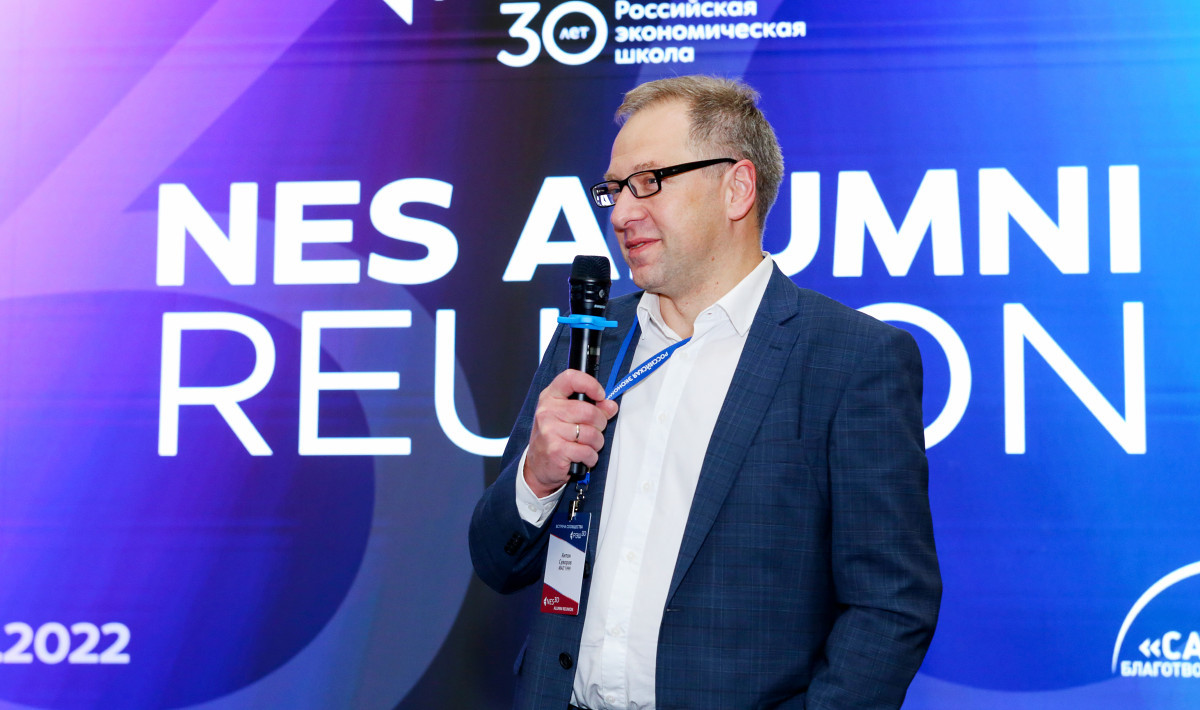Anton Suvorov (MAE'1999) has been heading New Economic School since September 1, 2022. We met with him to discuss what he has done over the past year and his vision for the future of NES. Professor Suvorov became the School’s sixth Rector, continuing the fine tradition established in 2018, when NES was first headed by one of its graduates..
– You have been at the head of New Economic School for more than a year. What are your impressions of the rectorship?
First of all, this work continues to be interesting to me. When I agreed to take the role, I knew that it would not be an easy or simple one, that it was a big responsibility, especially given the external environment. But this challenge to integrate myself into the work of a well-coordinated and professional team in a new status, to look for solutions and new opportunities together is an interesting task. The New Economic School is not foreign to me at all. I owe a lot to it, and it is a very nice and significant institution for me. Coming back and being a part of NES, especially in this role – I probably have said it many times already, but I can repeat it again – is a great honor. My main motivation was, and still is, the desire to try to help the School as much as I can, to try to make sure that the strategic goals are achieved, and that NES, with its unique heritage accumulated over its 30 years of history, would continue to develop, become bigger, stronger and better, would attract new students and professors, as well as new employees.
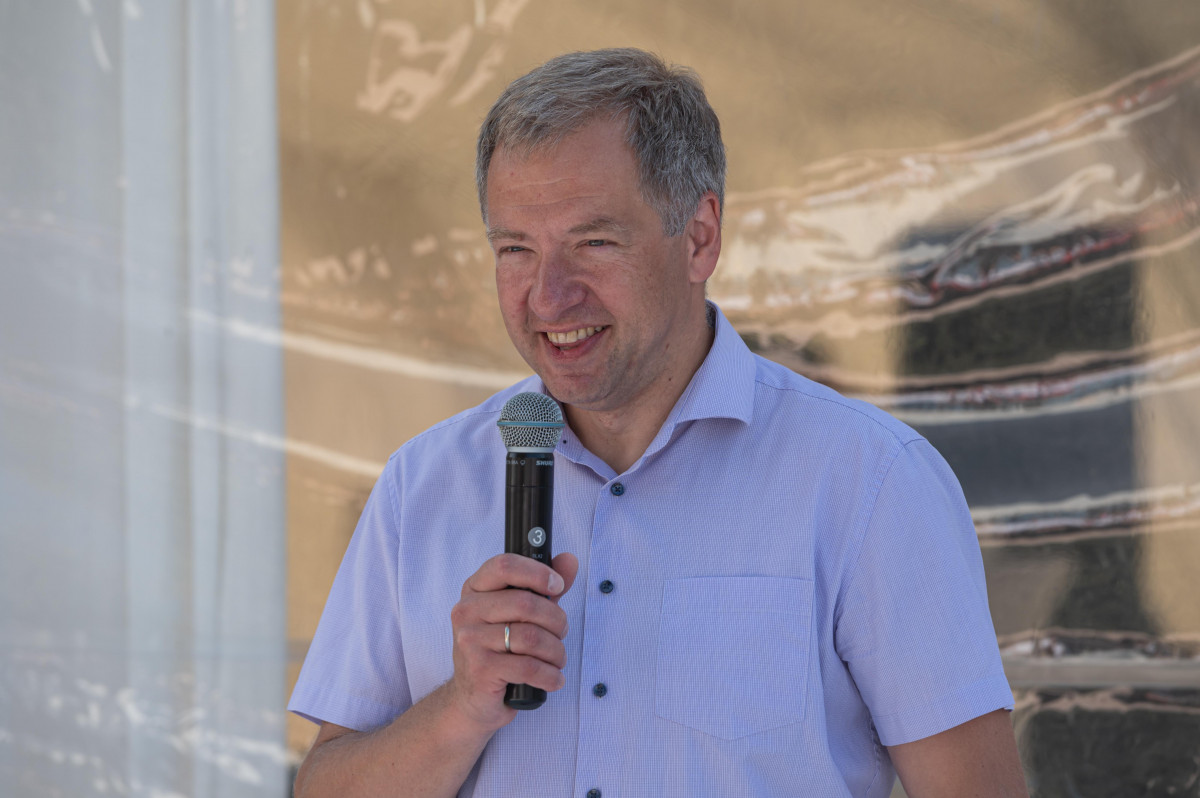
Welcome Day 2023
– The most important and key focus for you now is...
Make one day have 36 hours (laughs). All kidding aside, the key task now is to adapt the NES Development Strategy to current conditions. The document that was adopted under Ruben Enikolopov is designed for the period through 2025, and many goals, such as having our own campus, have already been successfully achieved and implemented. At the same time, we continue to pay the loan for the building in Skolkovo. Financial issues always require special attention, and in this sense, NES is in a vulnerable institution that depends on the support of donors. Many of them have stayed with us, and we are very grateful to them, especially when they are facing challenging times themselves. We understand them very well and hope that the companies and individuals who have supported the School will not turn away from us in this difficult period and will continue their support. We express our gratitude to the major individual and corporate donors of 2022-2023, including Nornickel, Russian Railways, Sberbank, Severstal, and SAFMAR Charitable Foundation. Despite the fact that the year was not an easy one, we are happy to connect with new partners and embark on new projects supported by philanthropists. Raiffeisenbank has provided grants and scholarships, Alber Blanc has established a second grant and supported the NES Career Development and Leadership Center.
We have recently launched a new fundraising campaign "Point of Growth", which focuses primarily on the School’s alumni. We would like to thank everyone who has already joined the campaign – almost 130 people. We are grateful and appreciate everyone’s contribution very much. At this point, we have raised almost 9 million rubles. The power of NES is in its great and united community. Now, I can see the proof of it already from the position of the head of the School. We thank Dzhangir Dzhangirov (MAE'2004), who became the first to join the "Point of Growth" campaign, Natalia Puzyrnikova (MiF'2009) and Alexander Zozulya (MAE'2007) for their contribution to this campaign, Dmitry Garanin (MAE'2003) for creating a team of alumni who have been providing scholarships for students for already the third year, Sergey Korepanov (MAE'2003) for ensuring the work of the large scholarship fund, and all other alumni who support the School. For our part, we will try to meet expectations and give reasons for such support. We are happy that we can afford to carry on with our long-term strategic priorities, no matter how the situation changes. In all our endeavors, NES is supported and guided by our professional Board of Directors, which includes some of our alumni and many long-time friends of the School. I am very grateful to the members of the Board for all their help. It is invaluable!
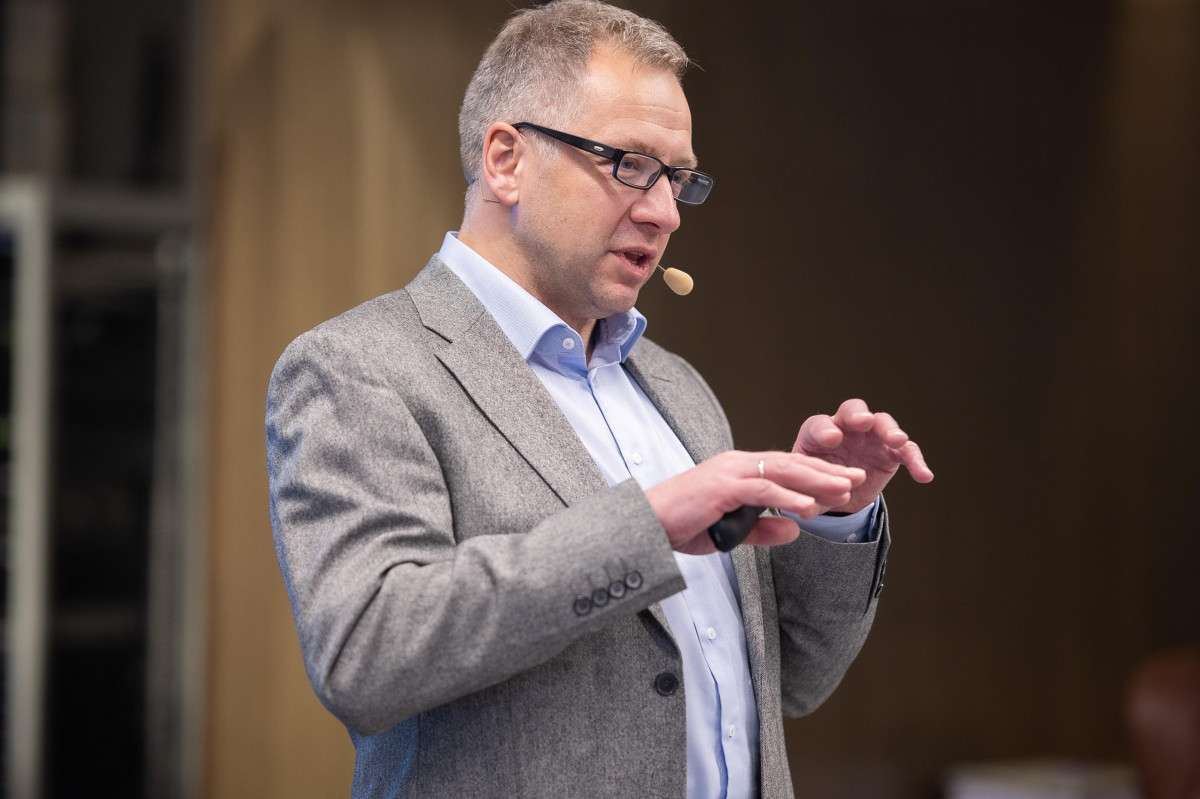
Anton Suvorov gives a masterclass at the CIWM graduation ceremony for Sber Private Banking employees
– Can you give an example and share some stories of success?
NES finally launched its own postgraduate [doctoral] degree in Economic Theory. It is an important stage of our educational strategy. We have been carefully moving toward this goal for a long time, and since September 1, we have had our first 3 graduate students in this program. All three are graduates of the Master of Arts in Economics program of different years: Daniil Gorbunov, Elvina Lukmanova (both MAE'2023) and Alexander Kalchevsky (MAE'2018). Now we can say that we are an institution of higher learning that spans the full cycle of education: we have a bachelor's degree, which is considered one of the most successful bachelor's programs in economics in Russia and a master's degree with multiple concentrations (economics and finance), including the increasingly popular MiF program, which attracts experienced professionals with established careers a program for. There is a growing demand for individual courses and short-term programs, including "Data Analysis for Business", "Fintech" and "Risk Management". We have launched a course "Venture Investments in China: Transactions Valuation and Structuring". The 2022-2023 academic year was also noted by the launch of the new Wealth Management Workshop (WMW) program.
In its programs, NES focuses on the best international practices and knowledge, accumulated over decades in various fields (the corporate sector, banks, audits, government institutions, startups). Another important question is how interested our future applicants will be in getting an education in economics or finance. It may sound odd, but in my opinion a period of high uncertainty and turbulence is a great time to invest in education and thereby strengthen one’s positions in life. Demand for the quality education that we provide at all levels remains. The New Economic School gives both fundamental and fairly flexible knowledge and skills. We know that NES graduates work in a variety of companies and organizations and can change the field of their work quite easily. In turbulent times, the ability to adapt and the flexibility that our graduates have seem to play a paramount role, and from this point of view, the demand for our education should only increase.
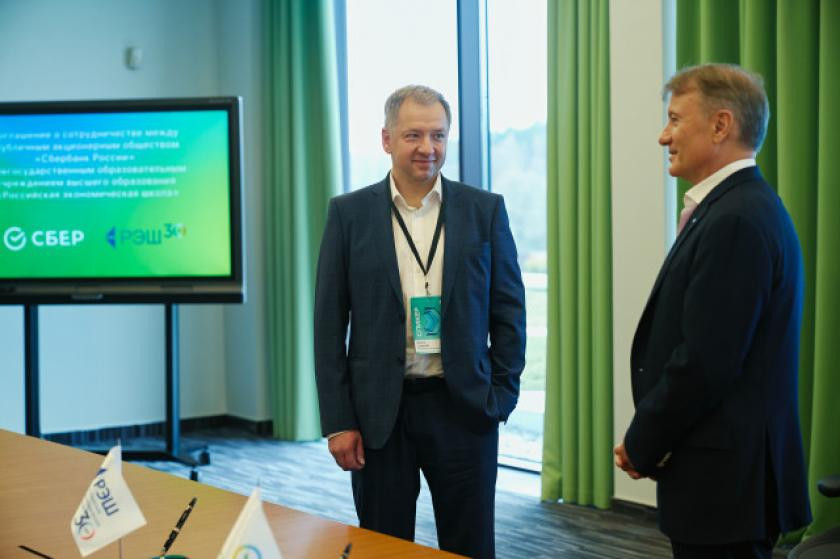
Signing an agreement with Sber
– By the way, what are the 2023 admission campaign results?
This year, we enrolled 186 new students. There are a couple of programs that have slightly decreased enrollment, and there are programs with notably higher figures than the year before. In general, we have met our targeted goals, but this year’s success does not guarantee that we will automatically get the same result next year. Of course, we will need to make efforts so that our prospective students learn about our School (those who do not know about us yet), and so that those who know about NES and are choosing a university come to us, because we can give them more than others and exactly what these students are looking for. One of NES’s special features is our unique faculty with more than 90% of professors having PhD degrees from leading international universities. I am truly happy with the fact that in the current environment NES remains a part of the international academic community. We continue to hire professors on the international job market. Over the past year, three new professors have joined us: Ivan Stelmakh (PhD, Carnegie Mellon University, 2022), Davide Cianciaruso (PhD, Kellogg School of Management, Northwestern University, 2017) and Shahir Safi (PhD, Universitat Autònoma de Barcelona, 2018). By the way, before NES, Professor Cianciaruso worked at the Higher Commercial School of Paris (HEC Paris).
We should also note the success of professors who have been with us for a long time. Nature, a respected, peer-reviewed journal, published an article by Sultan Mehmood that has sparked great interest in the global media. NES Academic Director, Ruben Enikolopov, who continues to lecture at the School, was elected Chair of the Board of the Review of Economic Studies, one of the top 5 economic journals in the world. I can continue listing news from NES’s academic life for a long time, but the main point is that we remain true to our fundamental principle: the best of the best continue to work at NES. And we try to maintain continuity. In 2023, seven graduates of the NES Master's degree programs entered PhD programs at leading universities, such as Stanford University Graduate School of Business, Harvard Business School, Hong Kong University of Science and Technology, Pompeu Fabra University, Pennsylvania State University, University of Michigan. Anastasia Nebolsina, a graduate of the NES and HSE Joint Program in Economics (2023), is now in the University of Chicago’s pre-doc program.
The mission of NES includes international exchange and free science. Therefore, it is equally important both to achieve these educational and academic goals, and to talk about them, so that the next generations of students understand the career opportunities in the academic, educational and corporate sectors that are available to them after NES. And we are always very happy when the School’s graduates, having received further high-quality education abroad, return as professors to their alma mater, as well as to other Russian universities.
– And you are a clear example of that…
(Laughs) Yes, indeed. I am already the second NES graduate to become the School’s Rector after Ruben Enikolopov. I like this emerging tradition. By the way, I want to say a few words of gratitude to Ruben, for his trust and support, and for the advice, he has given me throughout this year.
– In his interview, Ruben said that at some point you had to be persuaded to accept the offer. What made you take the decision? What was the key thing that helped you agree to become the NES Rector?
When you need to make such a decision, no persuasion really works well – people must decide for themselves. What was my motivation? It is difficult to give just one reason. Firstly, as I said above, this work is incredibly interesting, and it is clear that such proposals don’t come along a dozen times in a lifetime. Of course, it is a great responsibility, but it is also a unique opportunity, and I am glad that the NES staff supported and accepted me, and together we are trying to build a new, successful future for NES. In general, everyone works very professionally here. Of course, there are minor hurdles, like anywhere, but after a year, I still believe that NES is absolutely a lively, professional organization in which all employees try to be as friendly and client-oriented as possible, both to external partners and among colleagues. We all understand how much work, talent, and love many people have invested in our School and that a very high standard has been set.
NES Master's program Open House
– The terms of your rectorship seem to have not been discussed publicly. What is the term of your contact?
I have a three-year contract till the end of August 2025. Last year, when I had only just started my work as the NES Rector, the School celebrated its 30th birthday, an important milestone for us. Unfortunately, the year was marked by the sad news about the death of our dear friend, NES co-founder, Gur Ofer. Without detracting from the merits of other wonderful people who have invested a lot of effort and love in the establishment and development of the School, it would not be an exaggeration to say that without Gur, NES simply would not exist as we know and love it. We will always remember Gur with gratitude and thank him for the miracle that he gave us. In order to pay tribute to Gur Ofer, we dedicated the NES30 Academic Conference to him, and the NES Educational Days (winter series 2022, summer series 2023) now bear his name. I am very happy that we have this project: a series of online discussions on current topics in economics, finance and education. NES Educational Days is a live version of the "Economics Out Loud" podcast with the participation of NES professors and graduates, as well as representatives of the banking sector, corporations and startups. In addition, the NES popular science website GURU was named in honor of Gur Ofer. It is a collection of all educational materials that the School produces.
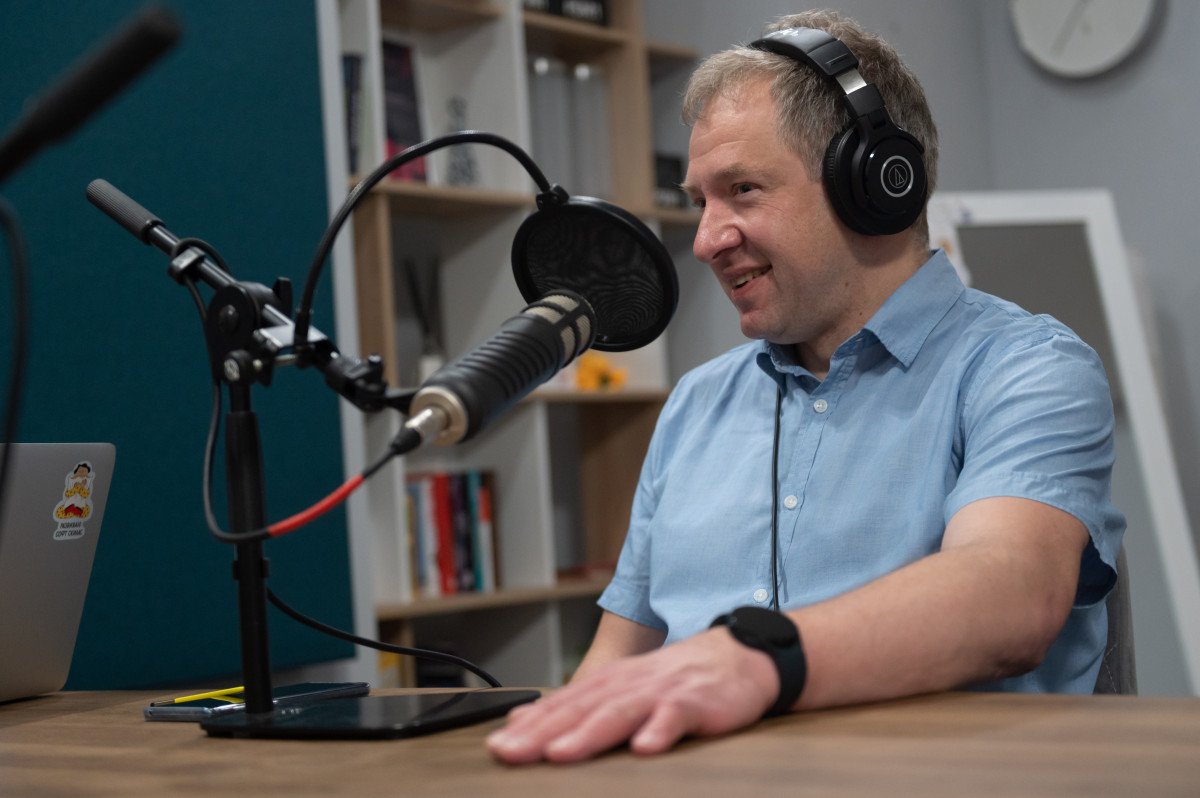
Recording of the "Economics Out Loud" podcast
– You were the head of the NES-HSE joint program in Economics for a long time, you know a lot about the undergraduate life. And you continue to communicate with them a lot. Have their demands changed over time, why do bachelor's students come to study at NES?
I see how the demand for everything related to data analysis and machine learning increases each year. We are trying to meet this demand, developing new courses for all our programs. This, of course, strengthens the position of NES as a university. If we talk specifically about the NES and HSE Joint Program, its distinctive feature is the availability to students of a wide range of humanities and natural science courses. I am very happy that the demand for such variety remains consistently high. Sometimes one course becomes very popular, then another one – this is normal, and I do not see fundamental trends here. There are some fluctuations, and they are natural. For example, we have not had cinema-related courses for a long time, and now there are three. Of course, they are not fully dedicated to cinema as such – we are not a University of Cinematography – but through addressing this topic, we give our students a unique experience. For example, one of these courses is actually about economics – about the economics of the Soviet film industry; the other is about the reflection of the Russian philosophy of the 19th century in the cinema of the 20th century; and the third one is actually about cinema, "cinema by touch". We are very glad that the students of the NES and HSE Joint Program not only receive a first-class economic education, but also become versatile, modern, thoughtful people – we just leave them no other choice.
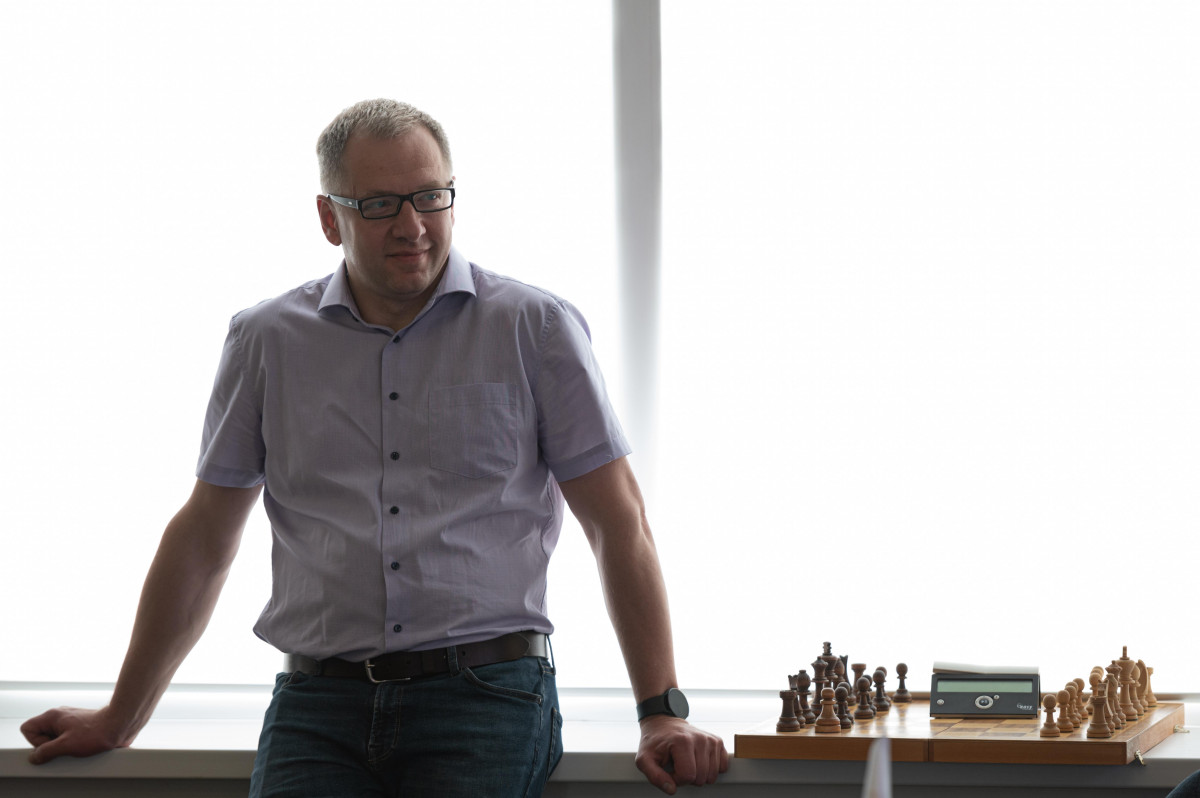
NES Open House 2023
– You specialize in behavioral economics, and it is one of the most popular branches right now. Do you continue to lecture at NES? What are your courses and in which programs?
Indeed, as things now stand I only teach courses in behavioral economics, but in two programs – in the NES and HSE Joint Program and in the master's degree program. I really love this subject, which – in accordance with the neoclassical economic theory tradition – looks at people respectfully as rational beings in general, but at the same time takes into account that complete rationality is an unattainable ideal. In their weaknesses and manifestations of irrationality, different people have a lot in common, so they can be a great subject of research.
– Do you still have time for any research activities?
I have much less time for this than I would like to. But when I can find a moment, it is a great pleasure. I am now finishing an experimental article with my co-authors (Jeroen van de Ven from the University of Amsterdam and Marie Claire Villeval from the University of Lyon).
– What is the subject of it? Can we talk about it?
We can, of course. In the experiment, we test the hypothesis that people's excessive self-confidence increases during group interaction. There is a lot of literature in behavioral economics that is devoted to overconfidence, but, as a rule, the vast majority of these papers focus on the overconfidence of specific people. This is natural: self-confidence is primarily a personal attribute, or a personal feature, or a state of an individual. But we have a hypothesis that it is in groups that conditions arise for excessive self-confidence to flourish, and we investigate a specific mechanism: group members willingly share news that indicates their high abilities and, conversely, hide information about their mishaps and failures. In such selective communication, it would be better if all the participants understood that both individuals and their comrades were behaving insincerely and would adjust to this when making group decisions. Our results show that people lack such insight and groups turn out to be overconfident and take excessively risky decisions.
NES Educational Days 2022
– Very interesting! We will be waiting for the paper. Let's talk about math some more. Your first degree is in math. How did you go from math to economics?
A year ago, Ruben and I discussed this in a podcast. At some point, I realized that doing just mathematics is not very interesting and promising for me, and that there are many people who are more motivated and talented in this field. By the time I was completing my degree in the Faculty of Mechanics and Mathematics at the Moscow State University, I had begun to look for my place in the world. I tried the consulting industry, but I quickly realized that the academic environment is closer and dearer to me. Two of my friends enthusiastically told me about the New Economic School where they studied. It was a turning point in my life. Studying at NES was very interesting, because I got into a great environment to learn completely new things and a very comfortable environment for me as a person.
Things that I liked about economics were twofold. On the one hand, the fact that math, which I knew quite well, was very useful. On the other hand, I really liked that academic economists find motivation for their research largely in the real world. I liked this connection between economics and reality, and this reality can be very different: from databases to literature, where interactions between people can also be of interest to researchers, and economists have something to say about this, too. Economics is the study of human interaction, and I found it very interesting. Economists look at human interactions, and, again, I really appreciate that they have great respect for human choice. In economics, one of the key concepts is choice, which is associated with responsibility. Economists actually consider an individual as a being who makes some kind of responsible choice. From the point of view of behavioral economics, of course, our choice is not always conscious, sometimes it is stupid, and we do unreasonable things. Anyway, economics, one way or another, is about our choices in different situations. It is very close to some areas of psychology or philosophy. If you read Viktor Frankl, his ideas related to mindfulness, the importance of choice, and proactivity are all close to economic thinking. This all seems very important to me. If we talk about psychology, then a rational economic agent is probably focused on the internal locus of control, which also characterizes his or her proactive life position; that is, an individual does not try to blame the external environment for his or her failures, but takes responsibility for their own decisions.
NES Alumni Reunion 2022
– Continuing with math, don't you think that the age of gadgets, the fact that you can instantly calculate anything and find the answer 'kills' the uniqueness of mathematics, reduces the number of enthusiastic mathematicians? Or is the situation not that bad and we are just talking about stereotypes?
This is a good and important question, and not an easy one. My thoughts are the following: a good knowledge of mathematics is still needed, simply because it organizes the mind very well. On the other hand, there is a risk when students start thinking that the world is more perfect than it really is. After all, math is a well-balanced science that offers certain answers to specific questions, and life is often quite complex, unpredictable, and there are many coincidences (at least, we cannot fully explain and predict many phenomena and therefore consider them generated by random factors).
I think that, on the one hand, we need to keep the fundamental mathematical component at both the bachelor's and master's levels. This is important. On the other hand, it is important that when studying courses in economics or social sciences, students get the understanding that there are other ways to look at the world, that they find productive combinations of math and humanities knowledge and skills, that they complement but not exclude each other. It seems to me that this is how we have it at NES. I have just read the preface to a book on HR-management by an economist with a very strong mathematical background, David Kreps, and an organizational psychologist, James Baron. They say that when they worked together on the book, they found many points of contact in which their knowledge and ideas complemented each other, and as a result, something new was born, something more than each of them could have brought to the book individually. There appeared great synergy.
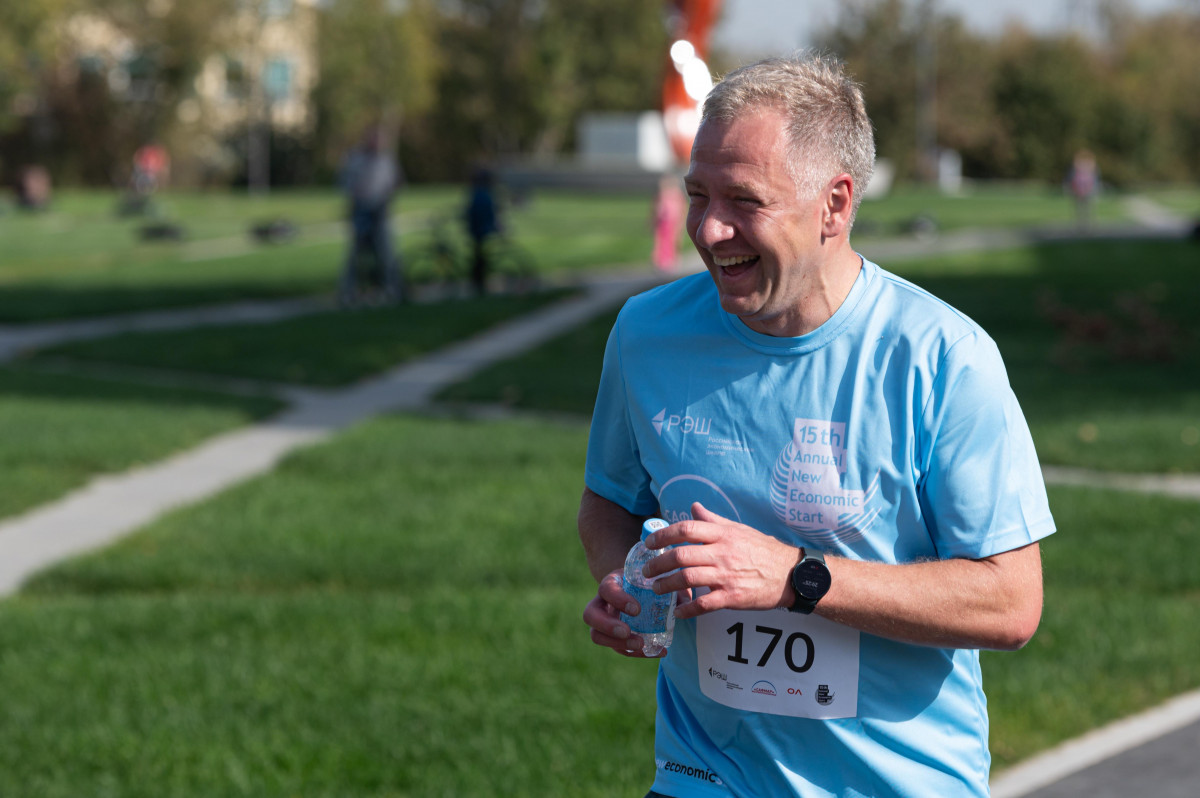
New Economic Start 2023
– You are quite actively involved in the life of NES at all levels. Together with your children, you often attend various events. Do you manage to find time to rest?
Can I skip this question? (Laughs). For me, all our offline activities are very important – all the events when people see each other, and communicate directly. When I first came to the campus, it was, frankly, quite empty, and the building itself appeared like an industrial facility, it seemed to lack comfort. But now I have appreciated the local atmosphere. I definitely like it here, everything looks well-designed, comfortable and modern. Perhaps there are still some technical issues that need to be resolved; for example, there was an echo in the classrooms, but we have sorted it out. I hope that over time everything will be perfect here on our campus. And if we return to individual impressions… We will continue to settle in our new home, maybe we will come up with some additional activities, organize our work processes so that we meet more often and interact live more.
– What would you wish for yourself?
Firstly, good luck, of course. Secondly, wit and good reasoning – this can never be in excess. Maintaining efficiency is also necessary. I would also probably wish for myself to find an opportunity, a way to organize everything so that teaching remains in my life, which I love very much, so that there is some kind of way of escaping, time for academic research. The development of the School is a clear priority, but my own family is also very important to me, so I wish myself to find time for my family and spare time for them.

NES Commencement Ceremony 2023
– What would you wish for the NES team?
I would like to wish them optimism, mutual support, as well as creativity, which we will definitely need, and steadiness. Objectively, we are going through uneasy times. And every day, we need to find an answer to the question of what needs to be done so that in the coming years we can keep the momentum, the dynamics that the School was able to acquire, despite the difficulties that we had before, for example, the pandemic. We must move forward with confidence and decide for ourselves what we would like to achieve in the next 5-10 years, so that in 10 years NES can also be proud of how well it has gotten through this difficult period.


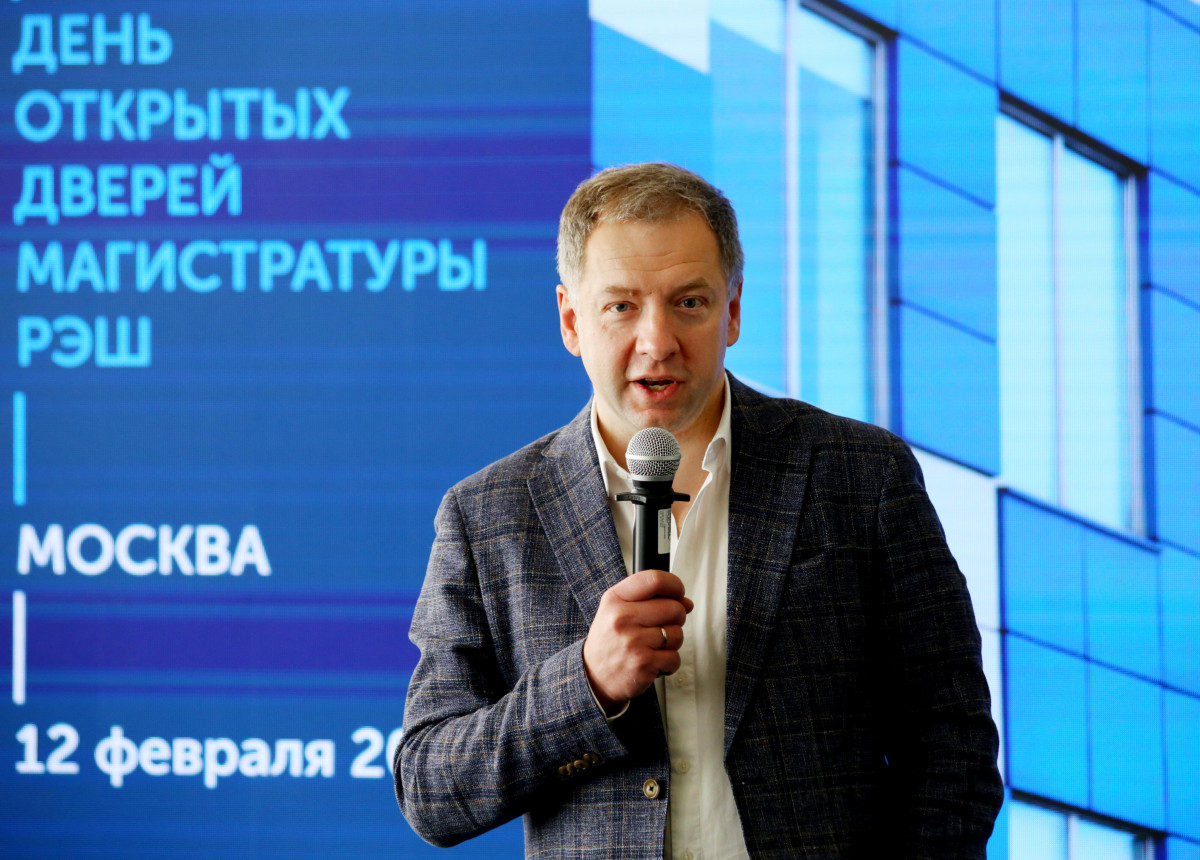
.JPG)
